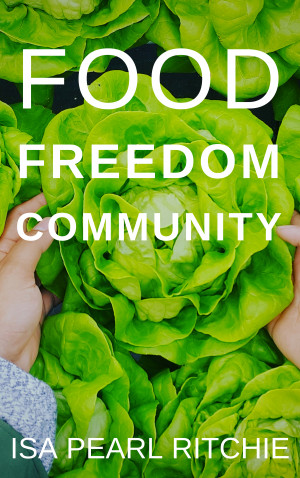Stephanie Jane recenzis Food, Freedom, Community de Isa Pearl Ritchie
A fascinating read
4 steloj
Subtitled 'How small local actions can solve complex global problems: Local solutions, community economics, and food sovereignty in New Zealand and beyond', I think this book was originally written as a degree dissertation and it does maintain that scholarly approach throughout the text. Much of Isa Pearl Ritchie's investigation focuses on the New Zealand town of Whangaroa which, over the past few decades has developed itself into a kind of oasis of sustainable, local farming and food growing, bucking the trend of increased commercialisation in favour of slow grown produce and community connections. Ritchie explores a numbers of contributing businesses, interviewing their owners and the people whose 'alternative' lifestyles complement the town's local and zero waste ideals.
I was particularly interested in how Whangaroa people, or those interviewed at least, interpret the word 'local' as it has a greater meaning for them than just something which has been produced within …
Subtitled 'How small local actions can solve complex global problems: Local solutions, community economics, and food sovereignty in New Zealand and beyond', I think this book was originally written as a degree dissertation and it does maintain that scholarly approach throughout the text. Much of Isa Pearl Ritchie's investigation focuses on the New Zealand town of Whangaroa which, over the past few decades has developed itself into a kind of oasis of sustainable, local farming and food growing, bucking the trend of increased commercialisation in favour of slow grown produce and community connections. Ritchie explores a numbers of contributing businesses, interviewing their owners and the people whose 'alternative' lifestyles complement the town's local and zero waste ideals.
I was particularly interested in how Whangaroa people, or those interviewed at least, interpret the word 'local' as it has a greater meaning for them than just something which has been produced within a certain distance of their homes. One of my personal gripes with the 'but it's local' brigade in Britain is that frequently no further investigation is undertaken into a food's source than establishing the miles it travelled, yet some awful farms can be 'local' and, to my mind at least, their practices do not deserve support. The DXE investigation into Hoad's Farm (which used to be my local egg producer) underlines this point. Yet, in Whangaroa, 'local' implies the ability for consumers to chat with farmers over the fence, and to establish a genuine rapport between the parties. There is a beautiful emphasis on this trust which underpins their whole idea of local food production.
From a vegan reader perspective, there are a couple of snarky anti-vegan comments from interviewees which I found confusing in this context as most of the vegans I know are actively trying to support, or even to establish from scratch, similar community food groups as Whangaroa has achieved. As an example of what can be done however, Food, Freedom, Community was a fascinating and inspiring read for me with lots of great ideas on future-proofing our food production and re-establishing our lost 'local' communities.

